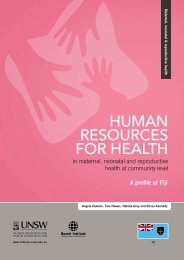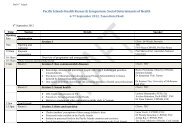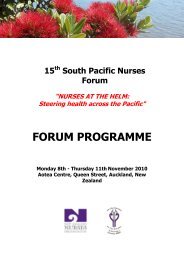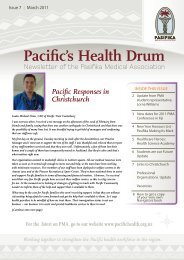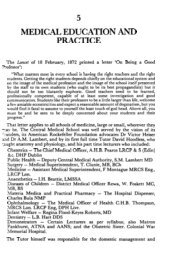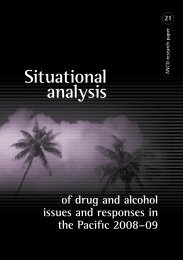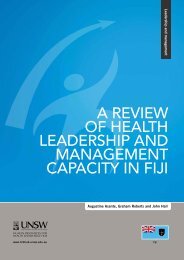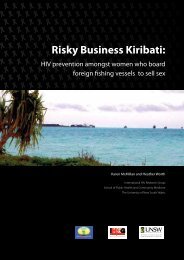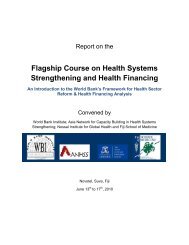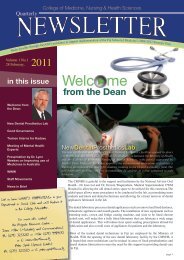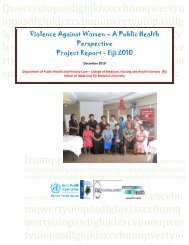rp21 situational analysis - Pacific Health Voices
rp21 situational analysis - Pacific Health Voices
rp21 situational analysis - Pacific Health Voices
You also want an ePaper? Increase the reach of your titles
YUMPU automatically turns print PDFs into web optimized ePapers that Google loves.
Kava<br />
Legislation<br />
As with many other <strong>Pacific</strong> nations, kava<br />
consumption in Samoa is traditionally a<br />
heavily ritualised process. 668 It continues to<br />
function as an important social and business<br />
lubricant, but consumption patterns have<br />
changed. Samoa is a member of the International<br />
Kava Executive Council (IKEC), which<br />
undertakes discussions around strengthening<br />
and building the kava export market. 669<br />
11.5 Local responses<br />
Specific to Samoa is the close proximity<br />
with American Samoa and the relationship<br />
between the two nations. With respect to<br />
current interventions, the Law and Justice<br />
Institutional Strengthening Project is likely<br />
to contribute to the ability of Samoa to respond<br />
to illicit drug issues and potentially<br />
to provide an opportunity to include harm<br />
reduction approaches. In addition, the desire<br />
to introduce the law and justice sector into<br />
the Strategy for the Development of Samoa<br />
2008–2011 has been highlighted. 670<br />
The legal system of Samoa is based on English<br />
common law and local customs. Samoa<br />
has a principle of judicial review of legislative<br />
Acts with respect to the fundamental<br />
rights of citizens. 671 It has not accepted compulsory<br />
International Court of Justice (ICJ)<br />
jurisdiction. The Narcotics Act 1967 is the<br />
most significant legislation for the control<br />
of illicit substances. Notably the maximum<br />
penalty for import and export of narcotics<br />
(s.17) is significantly lower at two years’ gaol<br />
than the maximum for supply or possession<br />
(s.18) at 14 years for persons aged under 21<br />
and seven years for persons aged over 21.<br />
In 2007, the Chief Justice called for a review<br />
of the penalties in light of recent patterns<br />
of offences. 672<br />
At the time of the 2004–05 <strong>situational</strong><br />
<strong>analysis</strong>, Samoa was not party to any of the<br />
three main international conventions on<br />
drugs (1961, 1971, 1988). Samoa acceded<br />
to the UN Convention against Illicit Traffic<br />
in Narcotic Drugs and Psychotropic<br />
137<br />
668 S. Percy Smith (1920), Kava drinking ceremonies among the Samoans. Journal of the Polynesian<br />
Society, 29(114): 1–21.<br />
669 Lifting the German ‘ban’ on kava exports: outcome and strategies of IKEC–EU consultations.<br />
IKEC press release, 29 October 2008.<br />
670 Samoa Country Report to 26th annual PILON meeting, Rarotonga, Cook Islands,<br />
6–10 December 2007: available at: .<br />
671 Profile on Samoa in CIA, The World Factbook, available at: ; International Court of Justice<br />
. Acting as a world court, the ICJ has a<br />
dual jurisdiction: it decides, in accordance with international law, disputes of a legal nature that<br />
are submitted to it by member states (jurisdiction in contentious cases); and it gives advisory<br />
opinions on legal questions at the request of the organs of the United Nations or specialised<br />
agencies authorised to make such a request (advisory jurisdiction).<br />
672 Samoa Chief Justice calls authorities to reconsider penalty for narcotics, Radio New<br />
Zealand International, 18 October 2007. Available at: (accessed November 2008).<br />
Samoa



